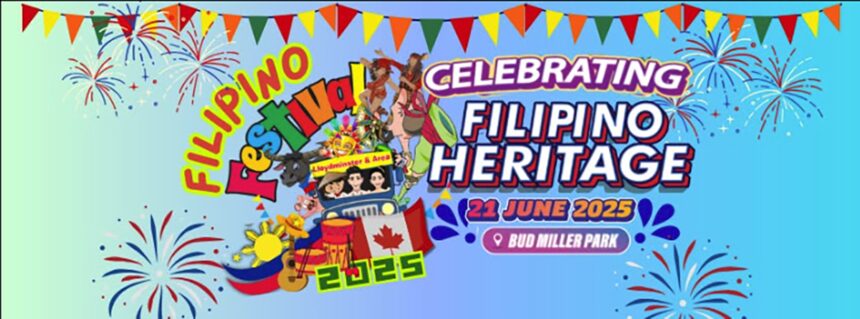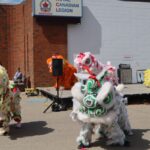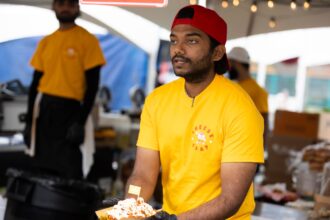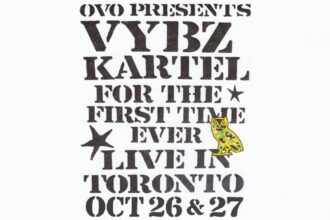The rhythmic beats of traditional kulintang music filled the air as hundreds gathered at Bud Miller Park last weekend for the 2025 Filipino Cultural Festival in Lloydminster. Against the backdrop of a perfect early summer day, the vibrant colors of traditional Filipino attire created a tapestry of cultural pride that has become increasingly woven into the fabric of this border city.
“This isn’t just a celebration for Filipinos—it’s a celebration for everyone in Lloydminster,” said Maria Santos, chairperson of the Filipino-Canadian Association of Lloydminster, which organized the event now in its seventh year. The festival has grown from a modest community gathering to one of the region’s most anticipated cultural events, reflecting the rapid growth of the Filipino community in the area.
What struck me most as I wandered through the festival grounds was the intergenerational nature of the celebration. Grandparents taught traditional dance steps to curious grandchildren, while teenagers proudly showcased their heritage to non-Filipino friends who had come to experience the festivities. This cultural transmission—happening naturally amid the laughter and conversation—speaks to something deeper than mere entertainment.
The culinary offerings alone were worth the trip. Long lines formed at food stalls serving everything from classic adobo and pancit to more adventurous offerings like dinuguan and balut. “Food is our love language,” explained Chef Ramon Diaz, who traveled from Edmonton to participate. “When we share our dishes, we’re sharing our history, our family stories, our heritage.”
According to Statistics Canada, the Filipino community represents one of the fastest-growing demographic groups in the Prairie provinces, with immigration rates increasing by nearly 35% in the past decade. This growth is particularly evident in mid-sized cities like Lloydminster, where economic opportunities in healthcare, energy, and service industries have attracted skilled workers from the Philippines.
Mayor Jennifer Blake, who formally opened the festival, noted how the Filipino community has enriched Lloydminster. “The contributions of Filipino-Canadians to our healthcare system, our schools, our businesses, and our cultural landscape cannot be overstated,” she said during her address. “They’ve brought not just their skills and work ethic, but their warmth, their family values, and their cultural traditions.”
The festival featured performances that ranged from traditional folk dances like tinikling and singkil to contemporary Filipino pop culture. A fashion show highlighted the evolution of Filipino attire, from pre-colonial indigenous clothing to Spanish-influenced formal wear to modern Filipino design. Each segment was accompanied by narration explaining the historical context—an educational component that festival organizers prioritized.
Perhaps most moving was the citizenship ceremony held during the festival, where twelve Filipino immigrants officially became Canadian citizens. The ceremony, witnessed by hundreds of festival-goers, embodied the dual identity that many Filipino-Canadians embrace—a pride in their heritage alongside a commitment to their adopted homeland.
For many attendees, the festival offered a welcome opportunity to connect with culture in ways both personal and communal. “My children were born here in Canada,” said Joel Mendoza, who immigrated from Manila in 2015. “This festival helps them understand who they are and where they come from. They’re Canadian, yes, but they’re also Filipino, and both identities deserve celebration.”
This cultural duality represents something increasingly central to the Canadian identity—a recognition that diversity strengthens rather than diminishes national cohesion. As communities like Lloydminster embrace celebrations of specific cultural heritages, they simultaneously create a more textured and resilient shared identity.
The Filipino Cultural Festival continues today with workshops on traditional crafts, cooking demonstrations, and performances by visiting artists from Winnipeg and Calgary. As social trends indicate growing interest in authentic cultural experiences, events like this serve as important bridges between communities and generations.
In a world where cultural identity can sometimes become a flashpoint for division, Lloydminster’s Filipino Cultural Festival stands as a reminder of how celebration can foster understanding. The laughter of children learning to count in Tagalog, the shared appreciation of flavors both familiar and new, the spontaneous dance lessons between strangers—these moments create connections that transcend difference and highlight our common humanity.
And isn’t that, after all, what cultural celebration should accomplish? Not just preservation, but invitation. Not just remembrance, but renewal. Not just identity, but community. In this sense, Lloydminster’s Filipino Cultural Festival achieves something worthy of reflection beyond its weekend run—it shows us how the sharing of culture enriches everyone involved.










